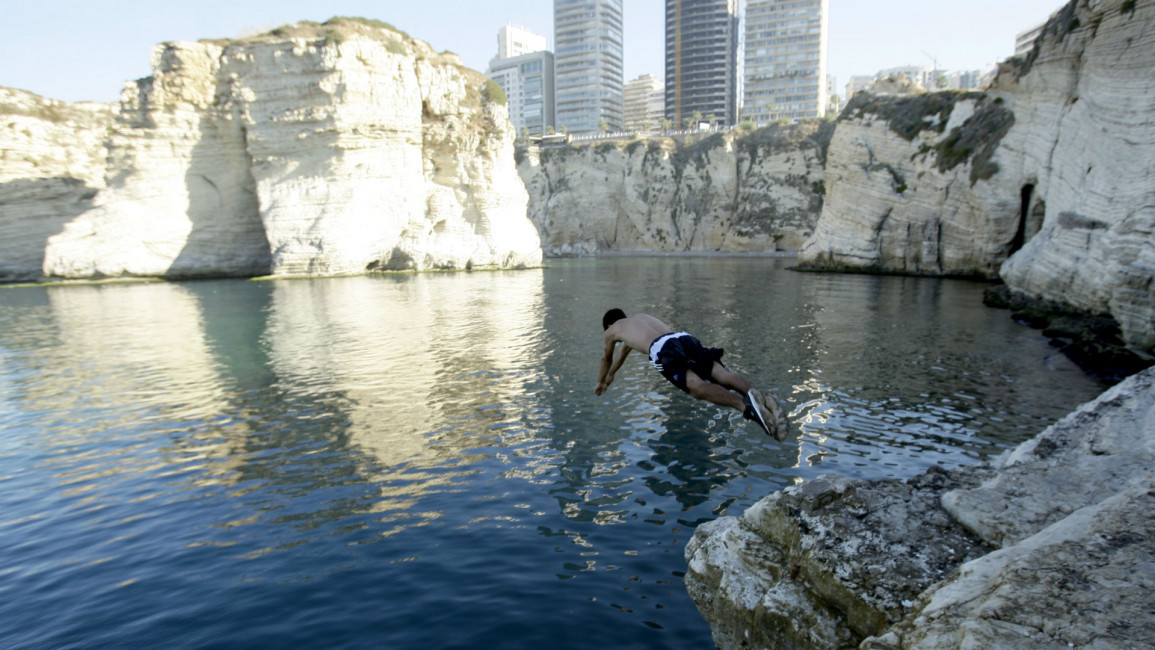
Real estate claims another victim: Beirut's seafront Pigeon Rocks
Skiing on the mountains in the morning and sunbathing at the beach in the afternoon, excellent cuisine, hospitality, lively nightlife, the red-tiled roofs and triple arched windows of Ottoman and mandate-period architecture, the natural beauty of Raouche and the Pigeon Rocks on the seafront. In troubled times we can at least comfort ourselves with these cliches about Lebanon.
Or can we?
| One of the last undeveloped coastal strips in Beirut, Dalieh, is slated for development. |
Let's just consider those for a second. The influx of a million and a half Syrian refugees in Lebanon since 2011 are causing an enormous strain on the country's resources, checking Lebanese hospitality and generally dampening its joie de vivre.
A scandal has rocked the food industry, with the Health Minister closing down several restaurants and food suppliers that sold expired food. Lebanon's cultural and historical heritage has been gradually eroded since the 1980s by unchecked real estate development, with decades-old zoning and building laws ignored or modified by developers and the elites who have interests in their projects.
And now, part of Beirut's ancient, natural beauty is no longer accessible to the public. In the latest assault on the environment, one of the last undeveloped coastal strips in Beirut, Dalieh, is to be the site of a development headed by internationally recognized architect Rem Koolhaas. Even more galling is that this strip of coast has views over the famous Pigeon Rocks, a national symbol of Lebanon that has been featured on inumerable stamps, postcards, menu and guidebook covers.
 |
|
| Newly weds at the Pigeon Rocks (AFP) |
The Civil Campaign for the Protection of Dalieh, comprised of activists, architects, engineers, urban planners and professors, published a persuasive Open Letter to Koolhaas in the online journal Jadaliyya on 15 December. It points out that environment protection and building laws have been transgressed in order to allow the project to go ahead:
"Historical and contemporary property records we have obtained unequivocally demonstrate that property boundaries in the area have been modified to encroach on the public maritime domain, in contravention of the law", the letter says. "In other words, a large section of the area where the project is currently planned has been illegally privatized."
It also stresses that the project will threaten "a rich archeological site" that traces Lebanon's geological history, as well as a "unique ecosystem" - that of the underwater caves and vermetid reefs where sea-life flourishes.
Finally, the project will damage public and civic life since the area is a beauty spot for people to stroll, picnic and dive into the sea. It "will erase an important social space and national landmark".
Two days after the publication of the Open Letter, Rem Koolhaas posted a response on Jadaliyya's comments feed just below the Open Letter. It is filled with statements of agreement about the importance of the Dalieh site and with expressions of his desire to collaborate with the campaigners should the project go ahead.
But it may be fair to say that if the project does go ahead, not many Lebanese will have much faith in him.
See more at the Dalieh Campaign Facebook group: https://www.facebook.com/dalieh.org




